To drive legally throughout the United States, you must at least have the required minimum level of auto insurance. For a lot of drivers, however, it is not enough to merely have liability insurance coverage. For coverage that does more than just pay for the other party’s expenses in the aftermath of an accident, you need to look into other forms of auto insurance.
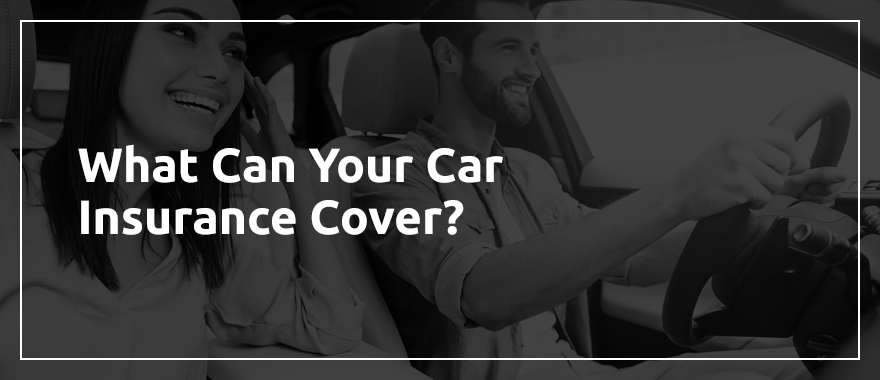
Car insurance policies come in many different varieties. For a policy that covers your expenses in addition to the other party, you need to have collision insurance. To cover your vehicle in the event of theft, vandalism, arson or damage from inclement weather or the elements, you need to have comprehensive insurance. Depending on the type of car you drive, your insurance needs could differ from the next driver.
These days, there are numerous types of auto insurance that are designed to cover select practices. If you don’t own a car but rent or borrow one from time to time, there are rental and non-owner policies that cover those specific concerns. If you drive your car for commercial as well as private purposes, there is ride sharing coverage that keeps you legally covered under both uses.
Personal injury protection (PIP) is an extension to a basic auto insurance policy that covers the hospital expenses and lost wages a motorist may incur from an accident. PIP functions as a no-fault form of insurance, meaning that claims are accepted regardless of the party at fault. If you are injured and temporarily waylaid from work following an accident in which you are deemed liable, you will most likely still receive coverage. However, as the liable party, you will still be subject to an increase in premiums on your PIP policy.
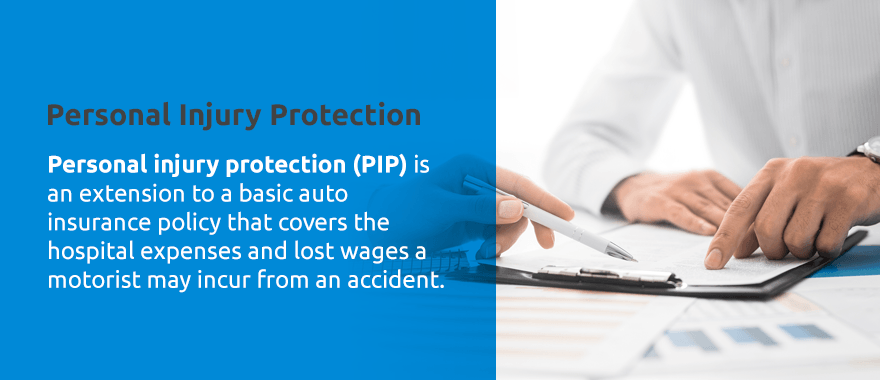
With a PIP policy, you file a claim with your own insurance provider. This stands in contrast to liability insurance, where you file a claim on the insurance of the liable party. Therefore, if you are responsible for an accident in which you and another party sustain injuries, you will file a claim with your PIP provider for coverage, and the other party will file a claim with your liability provider for coverage.
PIP insurance coverage differs from state-to-state, as certain states allow forms of medical coverage that are less accepted in other parts of the country. Examples of these differences may include the following:
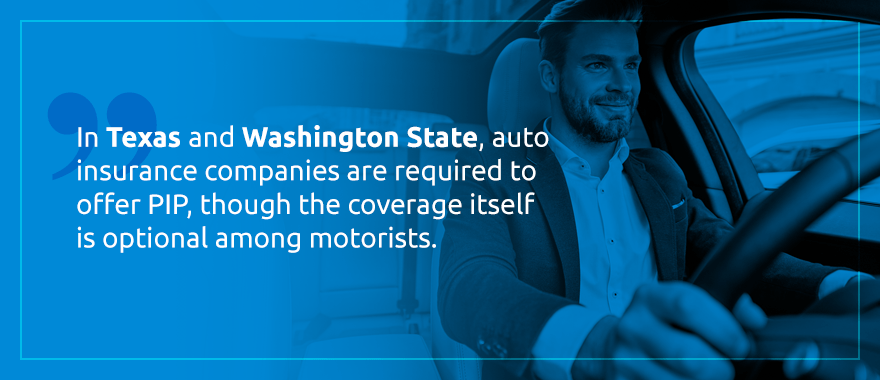
Policies also vary between different providers, with some PIP insurers imposing limits in the four-figure range and others offering upwards of a quarter-million in coverage. In certain states, a PIP insurance provider will pay directly for the expenses of a given claim and then recover that money from the insurance company of the liable party.
PIP insurance covers the vehicle owners as well as any passengers injured during an accident in said vehicle. Additionally, if you have a PIP policy and are struck by another car while on foot, you can file a claim with your PIP provider to cover your medical costs. A PIP policy can also cover funeral expenses if a claim is filed within a certain period.
PIP insurance is required in the following 16 states:
In Texas and Washington State, auto insurance companies are required to offer PIP, though the coverage itself is optional among motorists.
Learn more about personal injury protection here.
Auto medical coverage is similar to personal injury protection (PIP) coverage in that both are no-fault forms of insurance that cover the medical expenses you might sustain from an auto accident. The difference is that while PIP may compensate for lost wages in addition to hospital expenses, auto medical coverage is solely intended to cover medical costs.
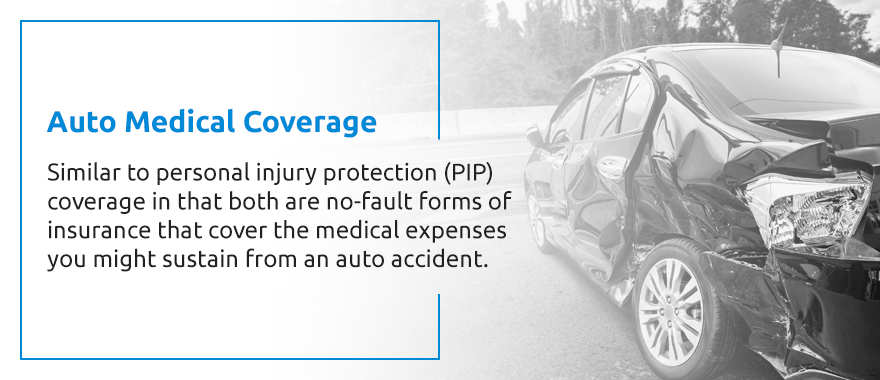
An auto medical coverage policy can have you covered up to a specified limit if you are ever injured in a vehicle collision. If an accident occurs along a highway or intersection, for instance, you file a claim with your auto medical coverage provider, regardless of which party is deemed liable for the accident. The same process would apply if you are ever struck as a pedestrian by a passing motorist. Examples in which auto medical coverage could be used include the following:
Auto medical coverage will also cover medical expenses sustained by passengers in your vehicle. In the event you have an accident where a passenger is injured, you would file a claim with your insurer on the passenger’s behalf.
Companies that offer auto medical coverage differ in terms of limits. Certain providers set coverage limits below $10,000 while others cover well into the six-figure range. If you are in the market for an auto medical coverage policy, it is best to shop around and do price comparisons between different providers.
The purpose of auto medical coverage is to be covered for any costs associated with hospitalization and medical recovery in the event of an accident, so you will need to consider the possible expense-parameter that could ultimately amount from an auto-related injury.
Whether or not you would actually need auto medical coverage may depend on the limits of your pre-existing insurance coverage. Are you fully covered by a comprehensive auto insurance policy with high limits, or do you feel that you might still need more coverage? Do you already have a PIP and, if so, what are the limits on that policy?
In certain states, auto insurance companies are required to offer auto medical coverage, and so it may be added to your liability policy unless you opt out of the coverage.
Learn more about auto medical coverage here.
Towing coverage is exactly what the name implies: a policy that covers the costs to tow your vehicle. The costs associated with vehicle towing can be expensive, even across short distances. With towing coverage, you can avoid the costly bills you might otherwise have to pay if your car fails, and you need to have it towed to a repair shop.
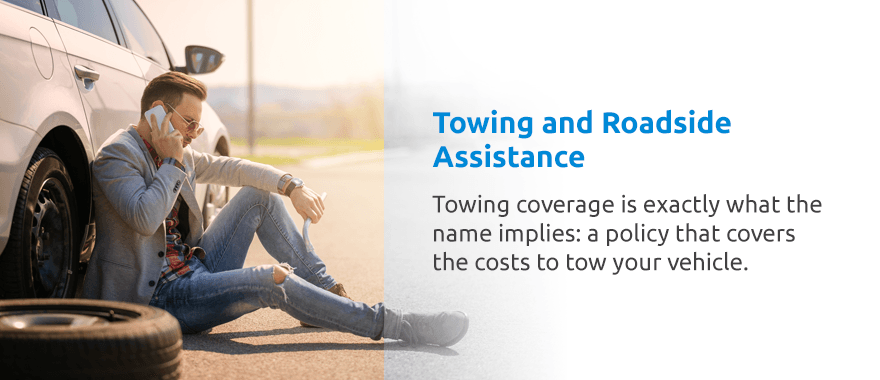
There are numerous instances in which towing coverage could come in handy, such as when your battery dies and jumper cables fail to start the vehicle. Consider the following possibilities:
People apply for towing coverage because it is not included with any level of auto insurance. Even if you have a comprehensive insurance policy, it won’t cover the costs of having your vehicle towed. If you have ever been in a situation where you suddenly found yourself stranded with an inoperable vehicle, you are probably familiar with the steep costs that towing companies may charge for their services.
Towing coverage is typically bundled with roadside assistance coverage, which provides coverage for auto expenses that may arise in the middle of nowhere. Not all instances of vehicle failure require a tow truck, as roadside help can easily dispatch to your location and rectify the problem at the scene. Whether you need a new battery or a replacement tire, the expenses can all be covered under a roadside assistance policy. Roadside assistance could come in handy in the following situations:
If you are driving down an interstate freeway and your oil emergency light starts flashing, the safest thing to do is pull over and call for roadside assistance from your smartphone. Within minutes, roadside help could be dispatched to your location to fill your oil tank to a sufficient level. The costs associated with emergency roadside fuel refills, tire replacements and engine-part change-outs can all be covered with towing and roadside assistance coverage.
Learn more about towing and roadside assistance coverage here.
Rental car insurance covers the costs of vehicular damage that might be incurred during an accident in a rental car. If you ever need to rent a car for any reason, rental car insurance will have you covered up to a certain limit. Whether you accidentally hit a tree or another vehicle, the insurance can cover some of the body damage and the possible replacement of ruined engine parts. If the policy has a high enough limit, rental car insurance can even pay for the cost of a rental car if you end up totaling the vehicle.
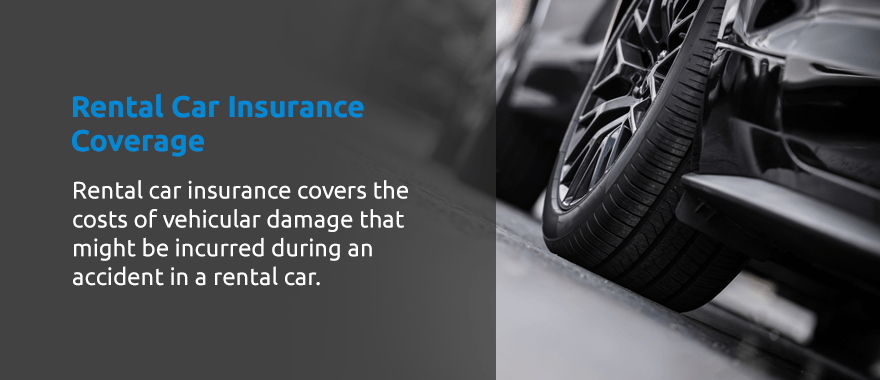
To a lot of drivers, the thought of rental car insurance seems extraneous because they never imagine themselves driving rental cars. However, you could easily find yourself driving a rental car if your primary vehicle needs to undergo a lengthy series of repairs. Alternately, you might need to use a rental car if you fly to another part of the country for several days or weeks and need a vehicle to get around that area. Consider the following possibilities:
Your need for a rental car insurance policy could all depend on your likelihood of renting a vehicle and whether or not you are already sufficiently covered. Do you travel frequently to other cities for days at a time on business? Do you only need a car during certain times of year and prefer to rent instead of own a vehicle? Even if you have only rented a car once or twice in the past, the out-of-pocket costs of renting may be enough of an incentive to get rental car insurance.
Depending on your pre-existing insurance coverage, you might already have sufficient coverage for any possible rental car. If you already have a comprehensive auto insurance policy, that coverage may pay for any repair costs that might be incurred on a rental vehicle. Even under certain liability policies, collision/loss damage waivers can be attached to your insurance to cover the cost of repairs on a rental car.
Learn more about rental car insurance here.
Some insurance companies now offer ride-sharing coverage, which basically functions as a form of commercial auto insurance for people who drive their own vehicles for ride-share services like Uber and Lift. If you earn money with your vehicle as an on-demand delivery or transportation-network driver, you could qualify for this type of insurance. Ride-sharing insurance can keep you covered in lieu of a regular auto insurance policy.
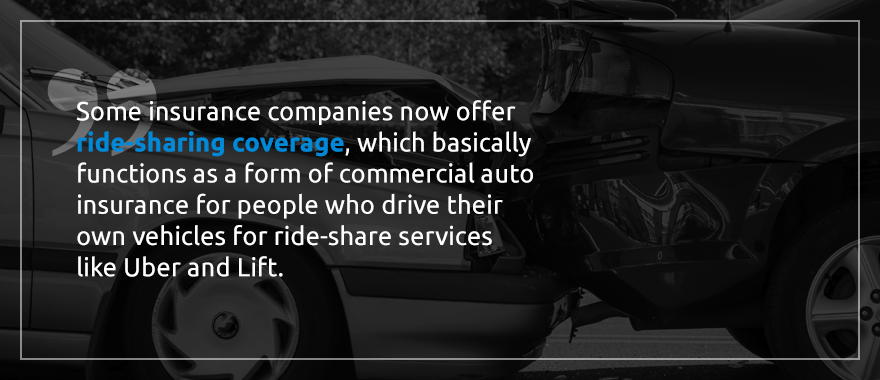
If you qualify for ride-sharing insurance, the policy will have you covered everytime you drive your vehicle. Whether you are on-the-clock doing deliveries or simply running personal errands, ride-sharing insurance will have you covered for the terms and limits set for your policy.
Ride-sharing coverage comes at several levels. As with regular auto insurance, you can purchase a ride-share policy to meet the minimum requirement of liability coverage, or you could also add collision or comprehensive to be covered for personal injury and vehicle damage.
To qualify for ride-sharing insurance, you must perform commercial deliveries in a personal vehicle, such as a car, van, pickup truck or SUV. If you drive a fleet truck, bus or limo, you will need to apply for commercial auto insurance.
Ride-sharing insurance only applies to the policyholder. A claim cannot be filed on a ride-sharing policy if a friend or relative borrows your car and crashes or totals the vehicle. Ride-sharing coverage is also only available in certain states.
Learn more about ride-sharing insurance here.
A non-owners auto insurance policy is designed to cover the costs of damages caused by an accident to a vehicle that you do not own. If you are driving a rental car, for instance, a non-owners policy could cover any damages incurred that fall within the limits of that coverage. Additionally, if you crash a vehicle owned by a friend or relative, non-owners insurance may cover some or possibly all of the repair costs.
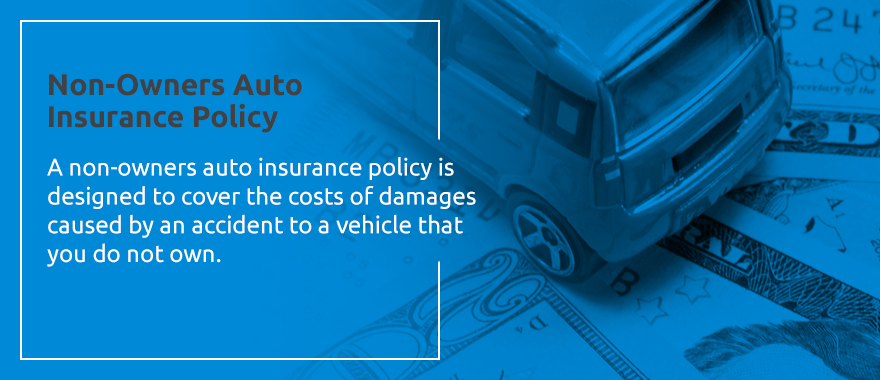
A non-owners policy is a worthwhile piece of insurance if you drive from time to time, but not frequently enough to justify owning your own vehicle. Granted, non-owners insurance overlaps in certain areas with rental car coverage. The difference, however, is that while the rental car insurance applies specifically to rental cars, non-owners insurance is applicable to any vehicle you do not own — whether the car belongs to a rental agency, your cousin or your best friend.
There are various situations in which you could find yourself in need of non-owners auto insurance. If you only drive when you have access to vehicles owned by family members, you should consider this form of coverage. If you commute by mass transit locally, yet always rent or borrow a car on periodic vacations or business trips, a non-owners insurance policy might fulfill all of your coverage needs. Consider the following possibilities:
If you rent or borrow cars on a semi-regular basis, your likelihood of an accident in one of these vehicles is considerably greater, especially if unfamiliar driving routes, weather situations and even the vehicle itself are factored into each experience. In any of these circumstances, you wouldn’t want to be stuck with a sudden-out-of-pocket expense for a car you don’t own.
For drivers who rent or borrow instead of own, non-owners auto insurance is an affordable alternative to some of the other available coverage options.
Learn more about non-owners auto insurance here.
SR-22 coverage is not a form of insurance, per se. Instead, it is a certificate that proves you have auto insurance. Why would this be necessary? If you have been cited for roadside violations in the past, you may be required to carry an SR-22 certificate to prove that you are legally insured.
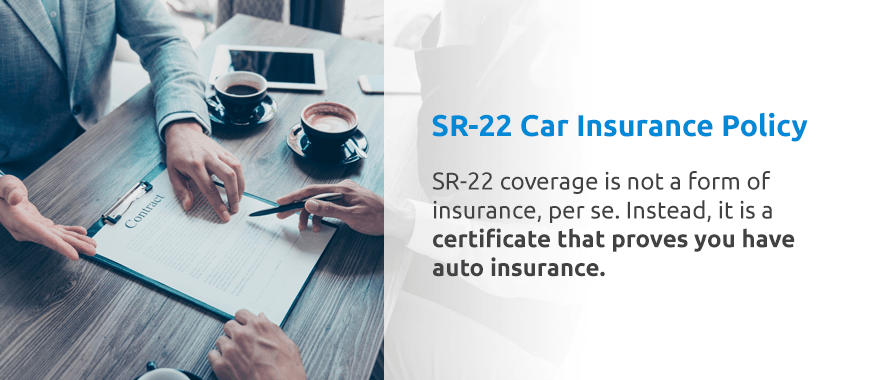
SR-22 is alternately referred to as a Certificate of Financial Responsibility because it basically states that you meet the required minimum for coverage in your state. You might need to carry an SR-22 for a certain length of time if you have recently been fined for any of the following:
You may also be required to carry an SR-22 certificate if you were the at-fault party in an auto accident. SR-22 laws vary by state, so you should check with your own state’s Department of Insurance to see whether you will need to carry the certificate. If you are required to carry the certificate, you will need to contact your DMV once it lapses — otherwise, you could lose your drivers license. The SR-22 timeframe is determined in court. This could result in needing it for anywhere from 3 months to 5 years.
SR-22 certificates are offered for three types of drivers:
In some, but not all cases, SR-22 certificates are issued with small fees and can raise your insurance premiums. It all depends on the provider. SR-22 applications are generally processed quickly and issued right away.
Learn more about SR-22 coverage here.
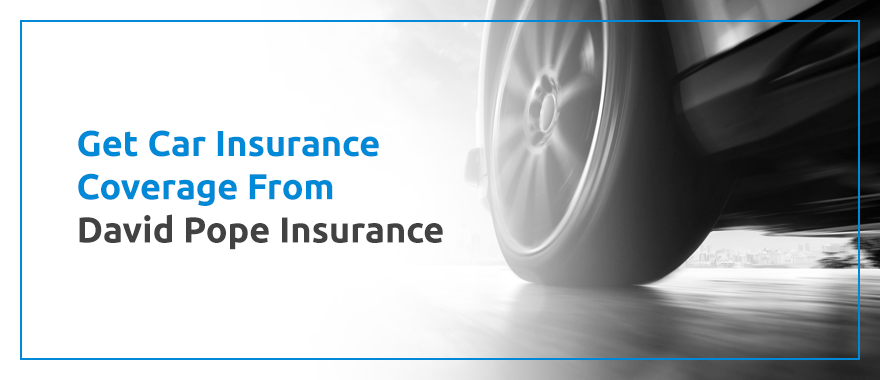
For more than 15 years, Dave Pope Insurance has been the trusted name in auto insurance for drivers in and around Union and St. Clair, Missouri. We have grown our reach to offer insurance in Missouri, Arkansas, Iowa, and Kansas.
Contact us today and fill out our form to request a free quote.